As more people move into urban spaces, balcony gardening has become increasingly popular. Not only does it allow us to grow our own produce, but it also adds a touch of greenery to our living spaces. However, it’s important to consider the environmental impact of our balcony gardens. By choosing eco-friendly materials, we can reduce our carbon footprint and create a more sustainable future.
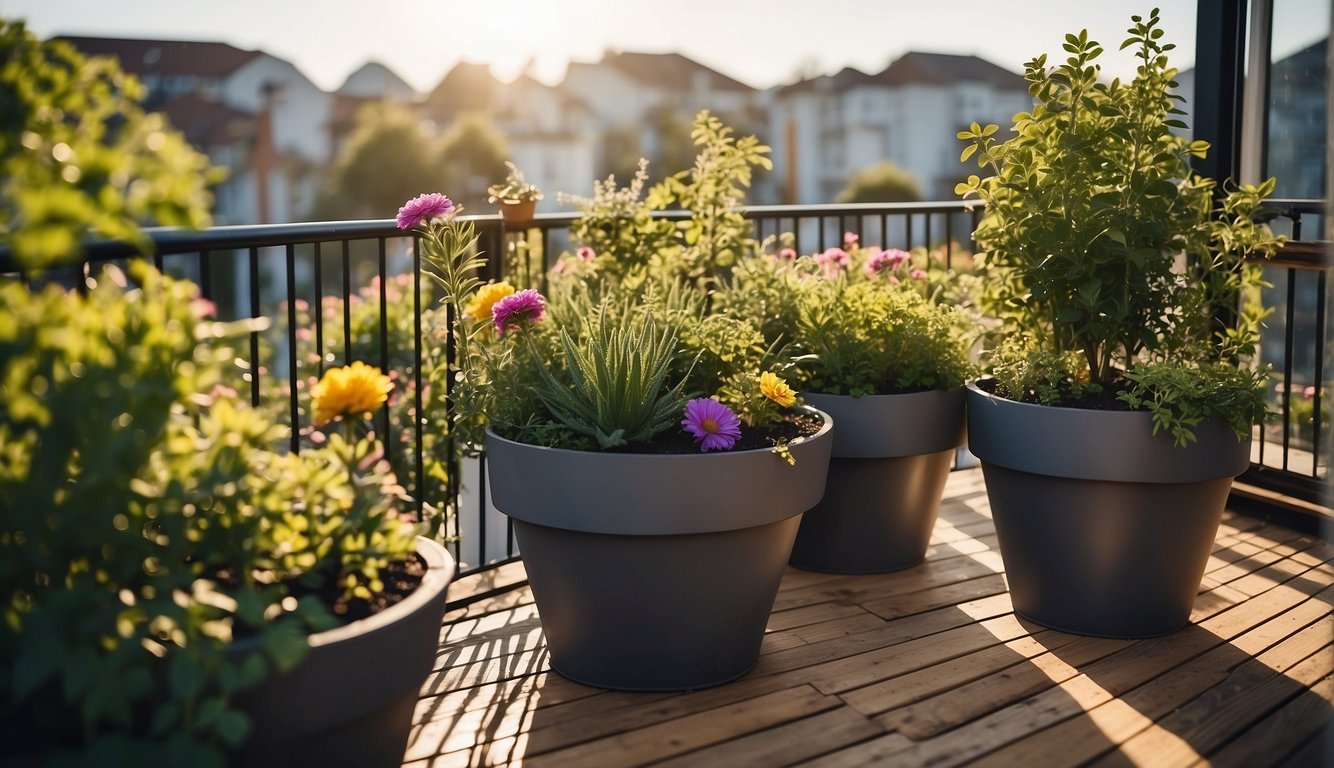
When designing your balcony garden, it’s important to consider the materials you’ll be using. Opt for natural materials like terracotta, bamboo, and wood, which are biodegradable and won’t harm the environment. Recycled containers and upcycled items are also great choices, as they reduce waste and give new life to old objects.
Choosing the right plants and materials is just the first step in creating an eco-friendly balcony garden. Proper planting and maintenance techniques are also important in reducing our environmental impact. By composting and using organic fertilizers, we can nourish our plants without harming the environment. Regular pruning and maintenance can also help prevent pest infestations and reduce the need for harmful pesticides.
Table of Contents
Key Takeaways
- Eco-friendly balcony gardens use natural and biodegradable materials like terracotta, bamboo, and wood.
- Composting and organic fertilizers can help nourish plants without harming the environment.
- Regular pruning and maintenance can help prevent pest infestations and reduce the need for harmful pesticides.
Designing Your Balcony Garden
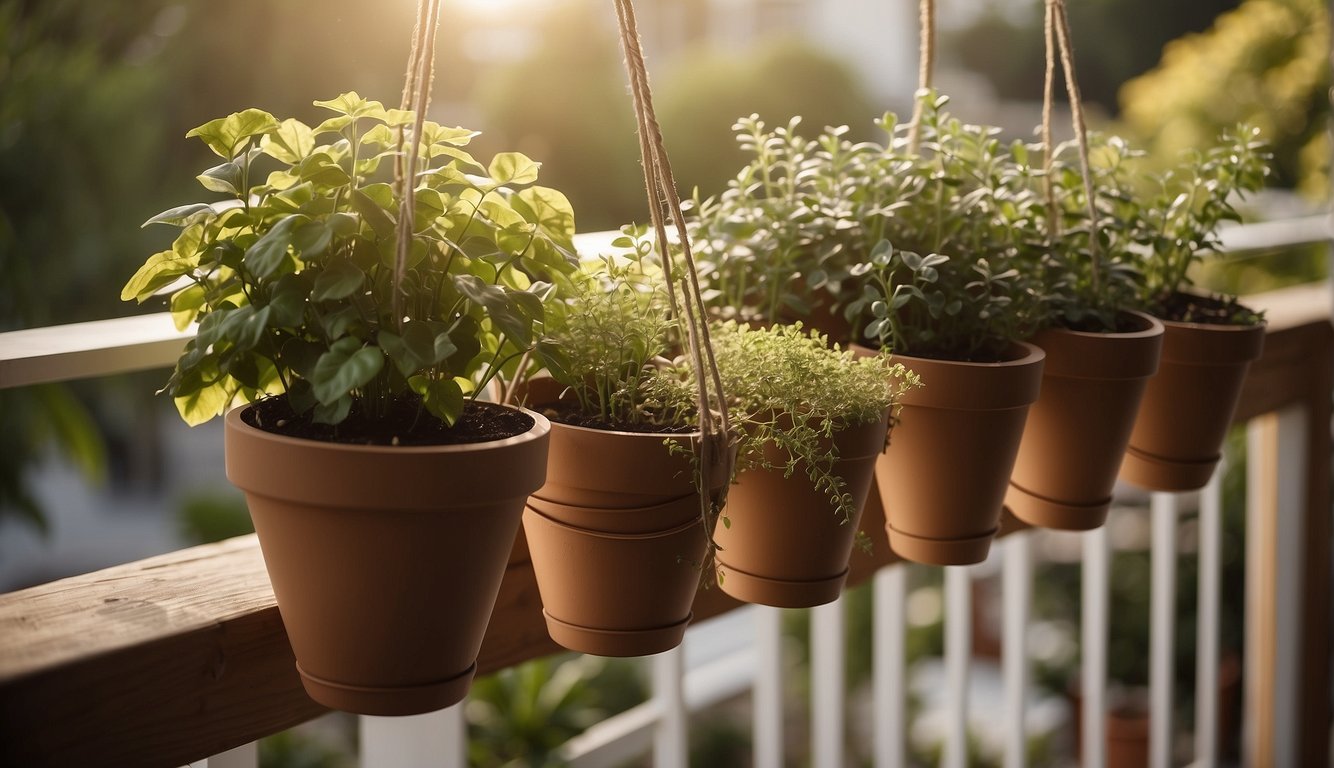
When it comes to designing an eco-friendly balcony garden, we need to consider a few factors such as the available space, sunlight, and the kind of plants we want to grow. We can start by selecting the right containers or planters that will suit the size and style of our balcony.
Vertical gardening is a great option for small balconies as it maximizes space. We can use trellises or hanging baskets to grow plants upwards, creating an attractive green wall. We can also use furniture such as benches or tables with built-in planters to save space.
It’s important to consider the sunlight and shade conditions of our balcony. We need to choose plants that can thrive in the available light. For instance, if our balcony receives a lot of direct sunlight, we can grow sun-loving plants such as herbs, succulents, and vegetables. On the other hand, if our balcony is shaded, we can grow plants that prefer shade such as ferns, hostas, and impatiens.
We can also create microclimates on our balcony by using shade cloth or umbrellas to protect our plants from harsh sunlight. Additionally, we can use reflective materials such as white pebbles or mirrors to reflect light onto our plants.
Comfort is also an important factor to consider when designing our balcony garden. We can use comfortable outdoor furniture such as chairs or loungers to relax and enjoy our green space. We can also add decorative elements such as wind chimes or bird feeders to attract birds and insects.
Finally, the location of our balcony garden is crucial. We need to make sure our plants are safe from pollution and toxic chemicals. We can use organic fertilizers and pest control methods to keep our plants healthy and free from harmful chemicals.
Choosing Plants and Materials
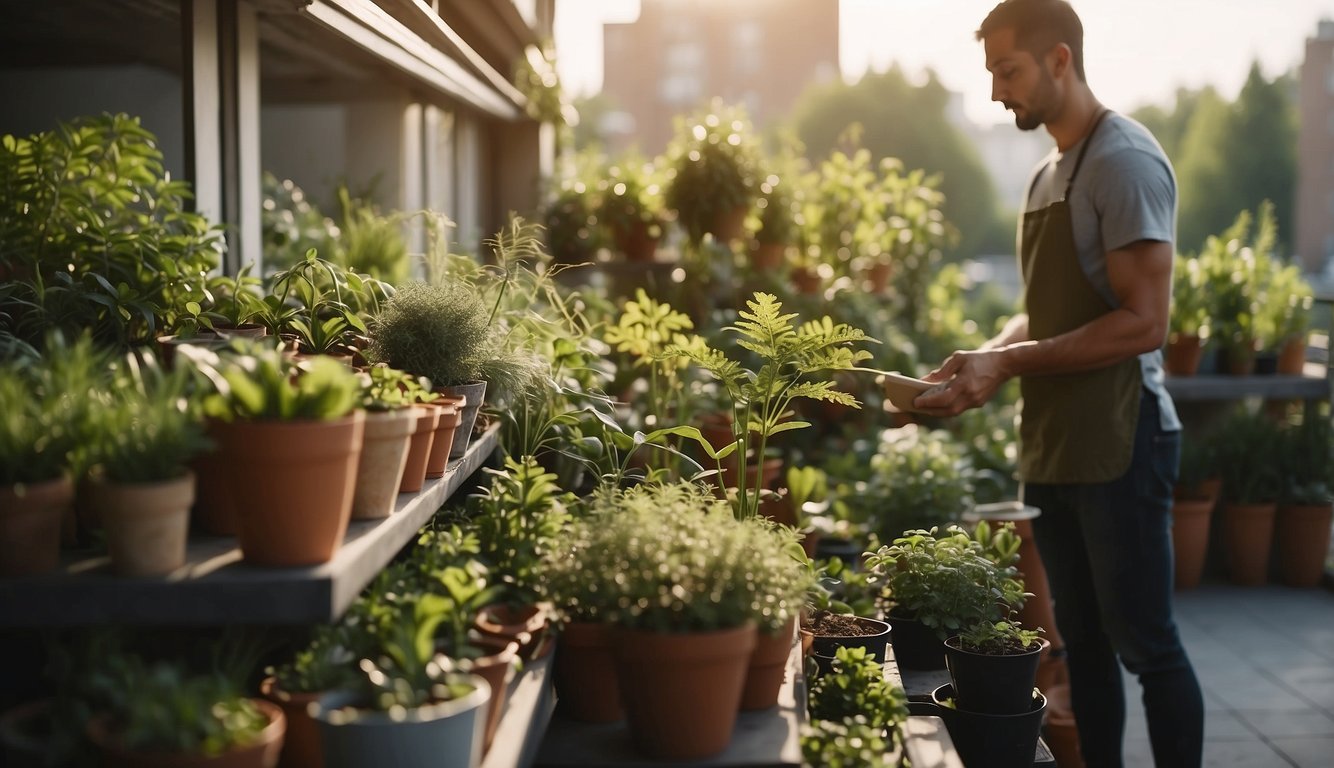
When it comes to creating an eco-friendly balcony garden, selecting the right plants and materials is crucial. In this section, we will discuss how to choose the best plants and materials for your balcony garden.
Selecting the Right Plants
Choosing the right plants for your balcony garden is essential for creating a sustainable and eco-friendly space. It is important to select plants that are well-suited to balcony conditions and require minimal care. Native plants are an excellent choice as they are adapted to local climates and require less water and maintenance. Additionally, they provide food and shelter for beneficial insects and pollinators.
When selecting plants for your balcony garden, consider planting a mix of flowers, vegetables, herbs, and fruits. This will not only provide you with fresh produce but also attract beneficial insects and pollinators to your garden.
Sustainable Materials
Choosing sustainable materials is an important aspect of creating an eco-friendly balcony garden. When selecting materials, consider upcycling or using natural materials such as wood or bamboo. These materials are not only sustainable but also add a natural and organic feel to your balcony garden.
Recycled plastic is another excellent choice for balcony garden materials. It is durable, lightweight, and eco-friendly. Additionally, it can be recycled at the end of its lifespan, reducing waste and promoting sustainability.
In conclusion, selecting the right plants and materials is crucial for creating a sustainable and eco-friendly balcony garden. By choosing native plants and sustainable materials, we can create a beautiful and sustainable garden space that benefits both us and the environment.
Planting and Maintenance
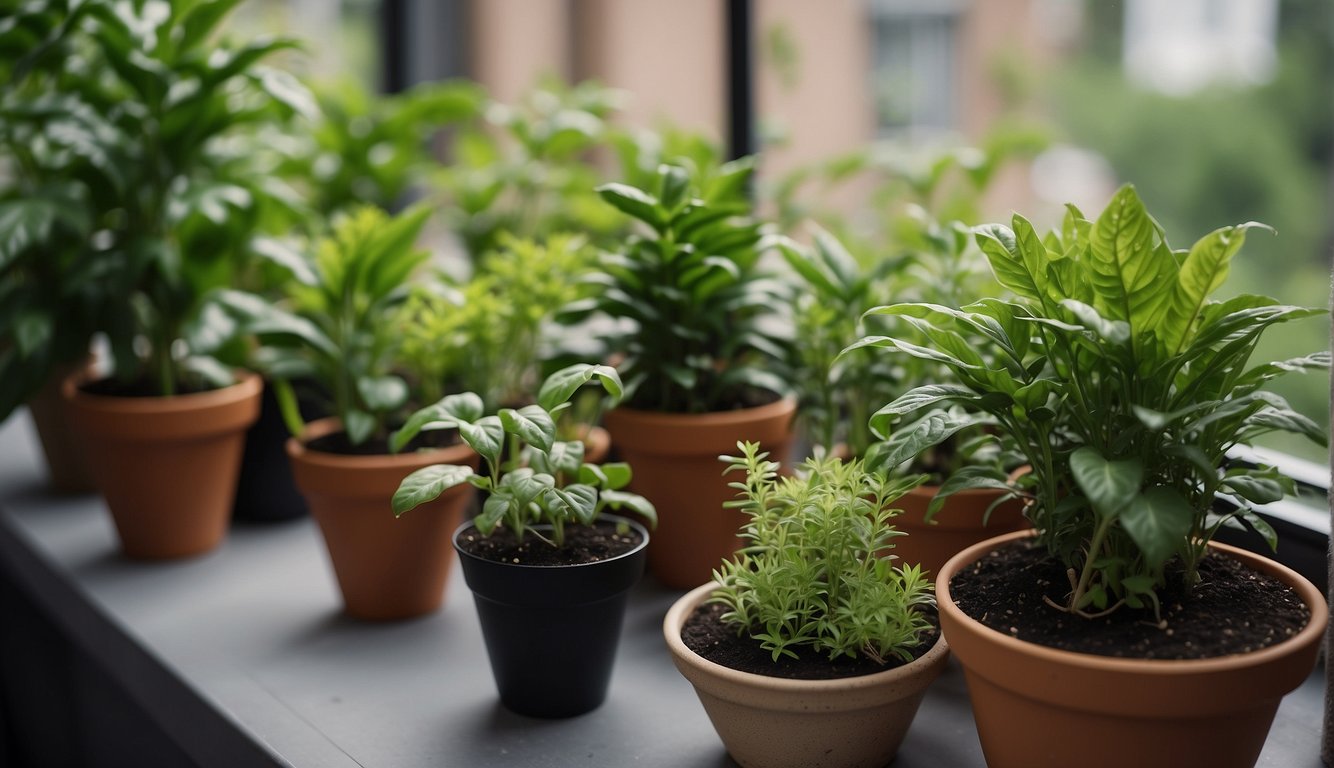
When it comes to planting and maintaining an eco-friendly balcony garden, there are a few key factors to keep in mind. From soil and planting techniques to watering and pest control, each step plays a crucial role in ensuring the health and vitality of your plants.
Soil and Planting Techniques
Choosing the right soil and planting techniques is essential for the success of your balcony garden. Opt for nutrient-rich compost and organic fertilizers to promote healthy growth and prevent root rot. Additionally, consider companion planting to create a natural defense against pests and diseases.
When planting, use self-watering containers to ensure your plants receive the proper amount of water without over or under watering. A drip irrigation system is also a great option for larger gardens, providing a steady supply of water while reducing waste.
Watering and Fertilization
Watering and fertilization are crucial components of maintaining a healthy balcony garden. Be sure to water your plants regularly, but avoid overwatering which can lead to root rot and other issues. Consider using a drip irrigation system to provide a steady supply of water without wasting resources.
When it comes to fertilization, opt for organic options such as compost or fish emulsion. These natural fertilizers provide essential nutrients without harmful chemicals or additives.
Pest and Disease Control
Pest and disease control is an important aspect of maintaining an eco-friendly balcony garden. Natural pest control options such as neem oil or soap sprays can help prevent infestations without harming beneficial insects or the environment.
Regularly inspect your plants for signs of pests or diseases, and take action immediately to prevent further damage. Consider companion planting and crop rotation to prevent the spread of disease and pests.
By following these simple tips and techniques, we can create a beautiful and sustainable balcony garden that thrives year-round.
Benefits of Balcony Gardening
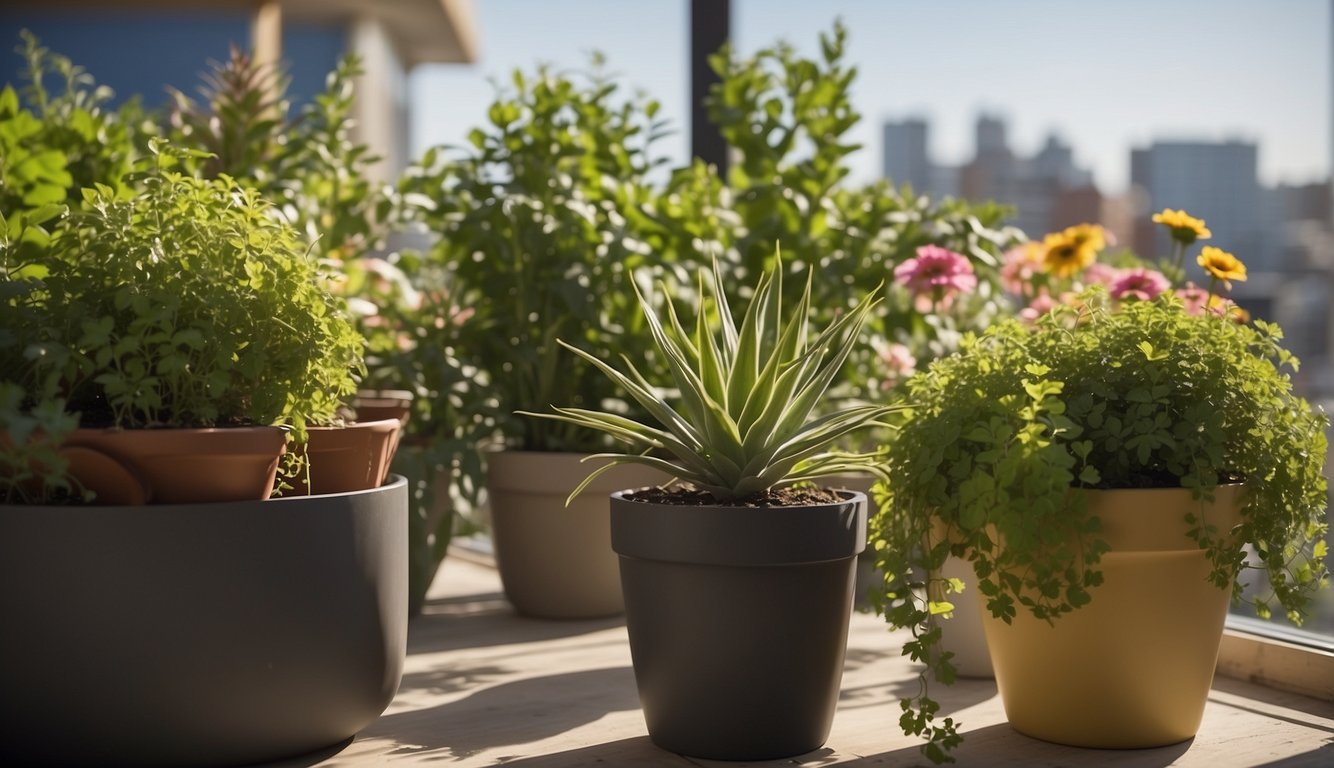
We believe that balcony gardening is a fantastic way to improve our health and well-being while also positively impacting the environment. Here are some of the benefits of balcony gardening:
Health and Well-being
Growing plants on our balconies is a great way to improve our health and well-being. Studies have shown that gardening can reduce stress and anxiety levels, improve our mood, and even lower our blood pressure. Additionally, growing our own produce can encourage us to eat more fruits and vegetables, leading to a healthier diet.
Fresh and Organic Produce
One of the most significant benefits of balcony gardening is having access to fresh and organic produce. By growing our own food, we can ensure that it is free from harmful pesticides and chemicals. Additionally, we can harvest our produce at its peak ripeness, ensuring that it is full of flavor and nutrients.
Environmental Impact
Balcony gardening can have a positive impact on the environment. By growing our own food, we reduce our reliance on mass-produced, shipped-in produce that uses significant amounts of energy and resources. Additionally, growing plants on our balconies can improve air quality and biodiversity in our urban environments.
Water Conservation
Balcony gardening can also help conserve water. By using water-efficient growing methods and collecting rainwater, we can reduce our water usage and waste. Additionally, growing our own food can reduce the carbon footprint associated with transporting and packaging produce.
Sustainability
Finally, balcony gardening is a sustainable practice that can help combat climate change. By reducing our reliance on mass-produced food and adopting sustainable growing methods, we can reduce our carbon footprint and contribute to a more sustainable future.
In summary, balcony gardening is a fantastic way to improve our health and well-being while also positively impacting the environment. By growing our own produce, we can have access to fresh and organic food, reduce our carbon footprint, and contribute to a more sustainable future.
Conclusion
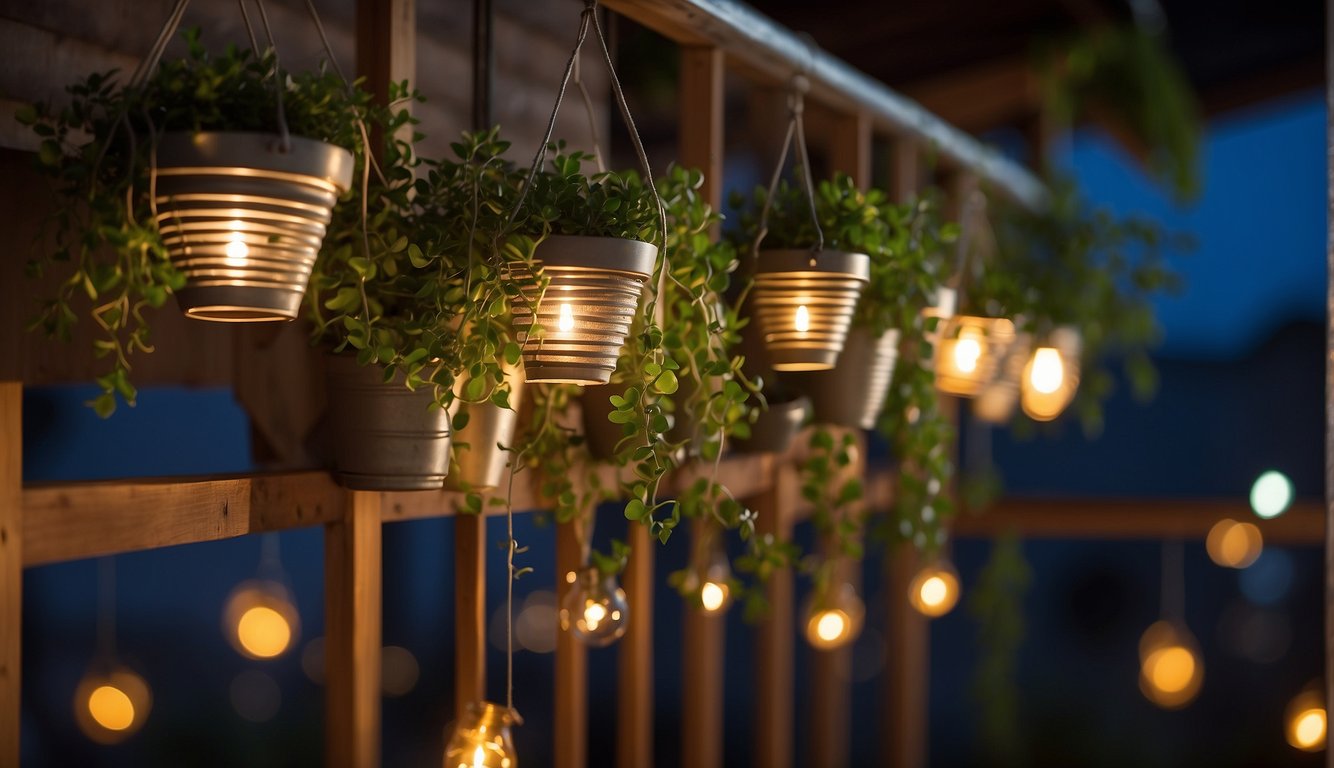
In conclusion, creating an eco-friendly balcony garden is a rewarding and satisfying lifestyle choice that benefits both us and the environment. By using sustainable materials, we can cultivate a green thumb and create an urban oasis that promotes sustainability and biodiversity.
We have learned that using materials like terracotta, natural fibers, and recycled plastic not only enhances the aesthetic appeal of our balcony garden but also contributes to sustainability. These materials are durable, eco-friendly, and can be reused, reducing waste and promoting a circular economy.
Furthermore, balcony gardening allows urban dwellers to create green spaces that promote health and well-being. By planting a variety of flowering plants, we can attract pollinators such as bees and butterflies, which play a crucial role in the ecosystem. These pollinators help fertilize plants, ensuring the production of fruits and seeds.
Overall, creating an eco-friendly balcony garden is an enriching and fulfilling pursuit that not only beautifies our living space but also promotes sustainability and wildlife. We encourage everyone to join us in creating a more sustainable and biodiverse world, one balcony garden at a time.
Frequently Asked Questions
What are the most sustainable materials to use for balcony gardening?
When it comes to sustainable balcony gardening, it’s important to choose materials that are eco-friendly, durable, and non-toxic. Some of the most sustainable materials to use for balcony gardening include recycled plastic planters, terracotta pots, bamboo planters, and wooden planters made from sustainably sourced wood. These materials are all long-lasting, and can be easily repurposed or recycled when they reach the end of their lifespan.
How can I ensure my balcony garden is environmentally friendly?
There are several ways to ensure your balcony garden is environmentally friendly. First, choose plants that are native to your area, as they will require less water and maintenance than non-native plants. Second, use organic soil and compost to promote healthy plant growth without the use of harmful chemicals. Third, choose eco-friendly planters made from sustainable materials. Finally, consider using rainwater or greywater to irrigate your plants, as this can help conserve water.
What are the best planters for creating an eco-conscious balcony garden?
The best planters for creating an eco-conscious balcony garden are those made from sustainable materials such as recycled plastic, bamboo, and sustainably sourced wood. These materials are durable, long-lasting, and can be easily recycled or repurposed when they reach the end of their lifespan. Additionally, self-watering planters can help reduce water usage by up to 70%, making them an excellent choice for eco-conscious gardeners.
Which organic fertilizers are recommended for balcony gardens?
Organic fertilizers are an excellent choice for balcony gardens, as they promote healthy plant growth without the use of harmful chemicals. Some recommended organic fertilizers for balcony gardens include compost, worm castings, and seaweed extract. These fertilizers are all rich in nutrients and can help improve soil health, leading to healthier, more vibrant plants.
How can I reduce water usage in maintaining my balcony garden?
Reducing water usage in maintaining your balcony garden is essential for eco-conscious gardening. One way to do this is to choose plants that are native to your area, as they will require less water and maintenance. Additionally, using self-watering planters can help reduce water usage by up to 70%, as these planters are designed to provide plants with the exact amount of water they need, without wasting any excess water.
What are some eco-friendly pest control options for balcony gardens?
Eco-friendly pest control options for balcony gardens include using natural predators such as ladybugs and praying mantises, as well as using companion planting to repel pests. Additionally, using organic pest control products such as neem oil and insecticidal soap can help control pests without harming beneficial insects or the environment.


